Sketch of Public Policy Communion, September 2019
|
2019年9月份國政聯誼會縮影 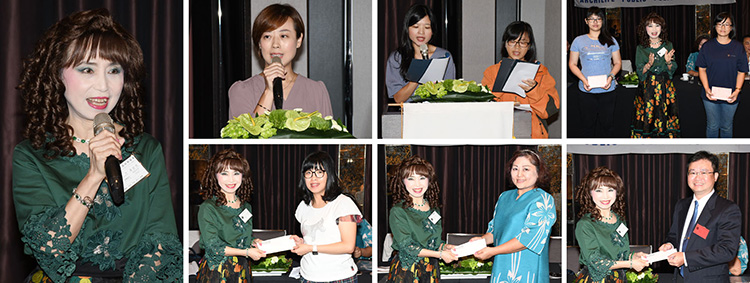 本會於2019年9月22日假台北晶華酒店三樓宴會B廳舉行「祐生國政聯誼會」。在主持人黃晉英秘書長宣布後揭開當日活動序幕,在輕鬆、活潑的節目過後,隨即由主持人帶來重要訊息:「祐生已於9月3日正式遷址「長‧安樓」,期望在全新的場域,建立更高的次序、提升效率。另外,外在環境不斷在改變,例如印尼災難級的霾害,隨著季風的吹拂,衝擊東南亞鄰近國家,台灣面臨生態變化導致蔥價暴漲,中美貿易戰也持續進行,這些都顯見末代四騎士已然降臨,而台灣因「八一七」公報但書須確保台灣防禦能力能保持相對於中國的水準,使得台灣在不穩定的局勢中取得平衡,也請在座各位共同努力,讓我們走出自己的道路,通過惡劣環境的試煉。」 The September Archilife Public Policy Communion of 2019 was held on September 22, 2019. After a series of relaxing and fun activities, Secretary General Huang Chin-ying made the following announcement, "Archilife was officially relocated to "Chang‧An Building" on September 3rd, hoping that the new site may help establish a higher order and enhance efficiency. Additionally, due to constant changes in the external environment, such as the disaster-grade haze in Indonesia blowing with the monsoon that impacts neighboring Southeast Asian countries. Taiwan, in the face of ecological changes, has been subject to shallot price hikes. Moreover, with the ongoing Sino-US trade war, the so-called last four cavaliers have arrived. For Taiwan, the August 17th communique proviso ensures Taiwan’s defense capabilities that match up those of China and enables Taiwan to achieve balance in an unstable situation. For those who are present here today, let us work together, take our path, and withstand the harsh environment." 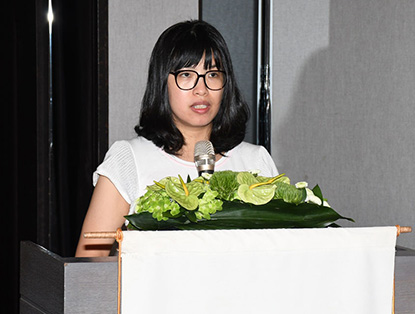 緊接著進行專題演講,由生活特組組長鄭瑋寧小姐進行「生活特組2019年上半年結案報告」。主講人首先表示本階段針對祐生潛盾計畫中心的衛生與健康促進方案,推估疫情發展,做好拮抗的應變。首先從氣候異變趨勢分析,長期高溫及乾旱的趨勢已確立,將對台灣公衛造成衝擊,應建立預警系統,降低風險。接著在個人衛生與教育訓練方面,應確切掌握所在地區氣候環境及生態條件,以強化進駐者身體健康及精神狀態。並應特別注意環境衛生管理以及傳染病的管制,建置有效率的醫療體系支援,培養人員救護技能,以及選用合適材質衣著,精進能源糧食供應操作手冊。未來將持續觀察,掌握各項因子變化,深化相關研究。 緊接著進行專題演講,由生活特組組長鄭瑋寧小姐進行「生活特組2019年上半年結案報告」。主講人首先表示本階段針對祐生潛盾計畫中心的衛生與健康促進方案,推估疫情發展,做好拮抗的應變。首先從氣候異變趨勢分析,長期高溫及乾旱的趨勢已確立,將對台灣公衛造成衝擊,應建立預警系統,降低風險。接著在個人衛生與教育訓練方面,應確切掌握所在地區氣候環境及生態條件,以強化進駐者身體健康及精神狀態。並應特別注意環境衛生管理以及傳染病的管制,建置有效率的醫療體系支援,培養人員救護技能,以及選用合適材質衣著,精進能源糧食供應操作手冊。未來將持續觀察,掌握各項因子變化,深化相關研究。Next on the schedule was the keynote speech. First, Ms. Cheng Wei-ning, presented a speech on the "2019 Archilife Living Special Team Meeting Implementation Report". The presenter first said that the focus in the present stage lies in Archilife Sub-Shield Center’s hygiene and health plans, epidemic development forecast, and proper countermeasure responses. First, based on the abnormal climate trend analysis, the long-term high temperature and drought trend have been validated, which will impact public health in Taiwan. Therefore, a prewarning system should be set up to reduce risks. In terms of personal hygiene and education training, the regional climatic environment and ecological conditions should be properly monitored in order to strengthen stationing personnel’s physical health and psychological status. Additionally, special attention should be given to environmental hygiene management and infectious disease control, efficient medical system support setup, personnel rescue skill training, and the selection of garments made of suitable materials, and the improvement of the Energy Food Supply Operation Manual. In the future, changes in various factors will continue to be observed to conduct more in-depth relevant research. 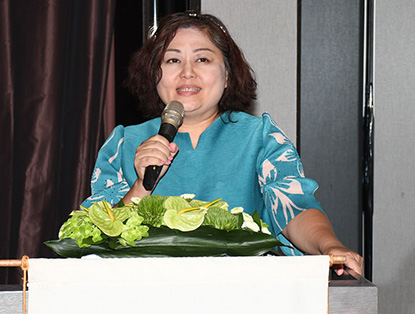 接著由國政會委員孫瑞穗小姐主講「地方創生與藝術節:聚焦大地藝術季」。主講人首先表示文化觀光的崛起,促進了地方的轉型與發展,以日本為例,日本「地方創生」政策是「國家級」的計畫,重點在於:1.通過東京奧運大型賽事來爭取全球資本轉向地方基礎建設的投資,2.為未來文化觀光的地方社區做升級,3.為缺少資金的社會福利做準備。在全球化年代中地方的營造,必須通過大眾觀光來互相往來和關聯,形成文化互動,產生了地方必須被再現、設計,才能被世界認識,並讓後代回頭認識自己。所以,地方營造的視覺與美學為重要課題。最後,主講人表示地方創生應升級的能力為:企劃、策展及設計,希望台灣地方轉型能在美學、文化及藝術的想像力,發揮真正的實力。 接著由國政會委員孫瑞穗小姐主講「地方創生與藝術節:聚焦大地藝術季」。主講人首先表示文化觀光的崛起,促進了地方的轉型與發展,以日本為例,日本「地方創生」政策是「國家級」的計畫,重點在於:1.通過東京奧運大型賽事來爭取全球資本轉向地方基礎建設的投資,2.為未來文化觀光的地方社區做升級,3.為缺少資金的社會福利做準備。在全球化年代中地方的營造,必須通過大眾觀光來互相往來和關聯,形成文化互動,產生了地方必須被再現、設計,才能被世界認識,並讓後代回頭認識自己。所以,地方營造的視覺與美學為重要課題。最後,主講人表示地方創生應升級的能力為:企劃、策展及設計,希望台灣地方轉型能在美學、文化及藝術的想像力,發揮真正的實力。Next, Ms. Sun Ruei-suei spoke on "Local Creation and Art Festival: Focused on Land Art Season". The presenter first said the rise of cultural tourism contributed to local transformation and development. Take Japan for instance; its “local creation” policy is a “national” plan whose focus lies in: 1. Seeking and directing global capital investment in infrastructure through Tokyo Olympic Games; 2. Upgrading the local communities for future cultural tourism; 3. Preparing for social welfare with fund shortages. In the era of globalization, locality creation involves interaction and association with mass tourism to form cultural interaction and reproduction, and design the localities to be recognized by the world and for future generations to recall who they are. Hence, the vision and aesthetics of locality creation are issues of great importance. Finally, the presenter said the local creation capabilities to be upgraded include: planning, curation, and design. It is expected that Taiwan’s true strength in aesthetics, culture, and art imagination can be brought into full play through local transformation. 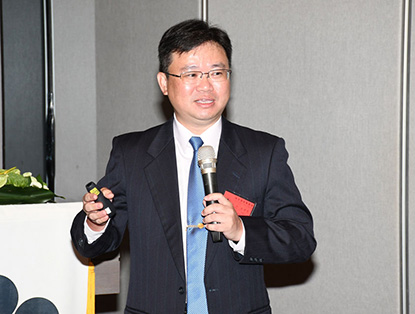 接著由國政會委員蔡坤憲先生主講「永續發展目標(SDG)與全球病媒防治策略」。主講人首先提到永續發展目標主要有17項,成員們可在各個專長領域項目做努力。主講人主要針對蟲媒傳染病進行研究,除瘧疾與登革熱外,也包含跳蚤防治。病媒控制需國內外跨部會合作、推動社區衛教參與、病媒監測介入防治及整合優化國家策略。接著,主講人進一步表示唯有親自實做,才能真正體會,因此帶領學生前往非洲實習,期望能讓學生重視大學社會責任。近半年在非洲肯亞進行沙蚤防治,逐步建置沙蚤防疫系統,建置校園的有機農場,以及乾淨飲水系統,幫助當地人民改善傳染病侵擾的情況。 接著由國政會委員蔡坤憲先生主講「永續發展目標(SDG)與全球病媒防治策略」。主講人首先提到永續發展目標主要有17項,成員們可在各個專長領域項目做努力。主講人主要針對蟲媒傳染病進行研究,除瘧疾與登革熱外,也包含跳蚤防治。病媒控制需國內外跨部會合作、推動社區衛教參與、病媒監測介入防治及整合優化國家策略。接著,主講人進一步表示唯有親自實做,才能真正體會,因此帶領學生前往非洲實習,期望能讓學生重視大學社會責任。近半年在非洲肯亞進行沙蚤防治,逐步建置沙蚤防疫系統,建置校園的有機農場,以及乾淨飲水系統,幫助當地人民改善傳染病侵擾的情況。Next, Mr. Tsai Kun-hsien spoke on "Sustainable Development Goal (SDG) and Global Vector Control Strategies". The presenter first mentioned the SDGs comprise 17 items, and members can work on the items based on their field of expertise. The presenter mainly conducted research on insect-borne diseases, including not only malaria and dengue fever but also flee control. Vector control requires inter-ministerial cooperation at home and abroad, community health education participation promotion, vector monitoring, intervention, and control, and integration and optimization of national strategies. The presenter further said that one can only understand by doing. Therefore, he led students to engage in internship in Africa, hoping that the students could learn to value university social responsibility. Over the past half a year, beach flea control was carried out in Kenya, Africa, sequentially setting up beach flea epidemic prevention systems, organic farms, and clean drinking water systems on campuses, thereby helping the locals improve the situation of infectious disease invasion. 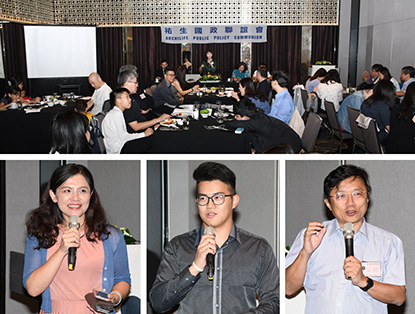 演講完畢,黃晉英秘書長代表基金會致贈謝禮予主講人。接著在與會者紛紛利用「餵豬時間」提出個人意見與看法互相交流後,圓滿地結束九月份國政聯誼會。 演講完畢,黃晉英秘書長代表基金會致贈謝禮予主講人。接著在與會者紛紛利用「餵豬時間」提出個人意見與看法互相交流後,圓滿地結束九月份國政聯誼會。After the speech, Secretary General Huang Chin-ying presented a gift to the speakers on behalf of the foundation. Then, attendees expressed and exchanged their opinions and views during the piggy hour. The September Archilife Public Policy Communion ended smoothly. |

